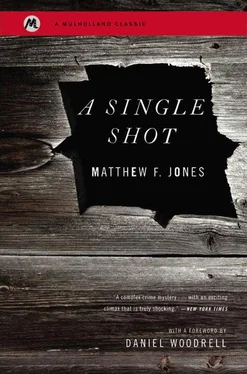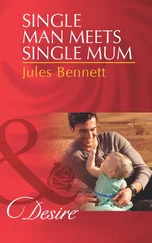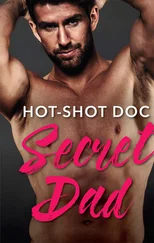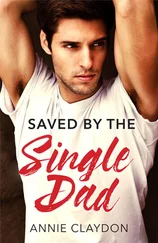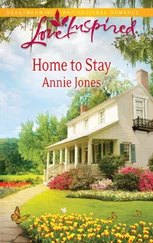John doesn’t say. Adrenaline and bile race into his stomach, so that for a few seconds he’s afraid he’s going to be sick. He glances at Abbie and wonders how long someone who’s had done to them whatever Waylon did to her stays unconscious. “How do I know you won’t hurt her once you got the money?”
“I’ve just explained to you, John, that was the Hen’s trip. Not mine. I’m a businessman. That’s all. Like every other employed slob in the world, I got people I got to answer to. I need my money back, John, or I’m the next one gets put in the ground. That’s how life works. Get paid, so you can pay. You think what I sold to the Hen was a gift to me? No. Life is a big wheel—somebody fucks with a cog like you did, John, and the whole wheel is shot. So, I’ve got to fix the wheel, okay? How am I going to do that? First you need to know that the girl will look like a totem pole if you’re not back with the money in ten minutes. Second, I need to know that while you’re up there in the outback that should you get to feeling like Davy Crockett and scrounge yourself up a musket and a lead ball, I can feel secure that the ball won’t end up in my brainpan. So what’s it to be, John? I take one of ten fingers, leaving you nine? Or one of two eyes, leaving you a cyclops? I know what I’d do.”
The focus of John’s thoughts is like a kitten curled up in the only sun-warmed corner of a dank, dark house: he won’t be responsible for another girl’s death. He stares into Waylon’s anvil-hard face, crisscrossed by pockmarks and tiny rivulets of sweat. “Did you think this son of a bitch was handsome?” his silent voice angrily asks Ingrid Banes. “Din’ ya see them eyes, colder than anything wild I ever hunted? Or was you just drunk with all his danger?” He lays an unwavering hand palm-down on the rail, then slowly spreads his fingers. Against searing pain, guilt will be his amulet.
“Nice try, John.”
“What?”
“I watched you open the door earlier, remember?”
John gazes blankly at him.
“You’re right-handed, are you not?”
John nods grudgingly.
“That’s the one needs altering, then.” Waylon smiles knowledgeably. His teeth appear well cared for and straight. His slicked-back hair is black as a beaver’s pelt. Momentarily sliding the knife beneath his gun arm, he reaches his free hand into his back pocket and pulls out a linen handkerchief. “You know, John, trigger finger.”
John takes his left hand from the rail and replaces it with his right. He spreads his fingers so that, of the five, his index finger is the closest to Waylon. He remembers his father once telling him about an old Iroquois trick whereby a captured brave, to divert pain inflicted by his torturers, would will the pain into the empty shell of a turtle. Waylon flaps the handkerchief in the air, then carefully lays it over the rail next to John’s hand. Still covering John with the pistol, he takes up the knife again. John empties his mind of everything but an orange-and-black box-turtle shell. Waylon quickly leans forward and, just above the lowest joint, deftly slices off John’s index finger.
John reaches out, grabs the handkerchief, and wraps it around the bleeding stub of his finger. He’s completely forgotten about the box-turtle shell. He pulls the mutilated limb into his chest and bends his knees with the pain, which is throbbing and deep. The white handkerchief is stained red. His breathing is shallow and fast. He hears his severed finger bounce off the deck floor and looks up in time to see it tumble into the grass below. “It’ll be there when you get back,” says Waylon. He wipes the knife blade on a napkin he’s picked up from the table, drops the napkin, and returns the knife to its sheath.
Doing semi-deep-knee bends, John applies pressure to the hand. Sweat pours from his brow. He swallows what tastes like the crest of vomit. He remembers, during his only attempt at factory work, seeing Burton Doomas lose two fingers in a machine that made bowling pins. One of the fingers had squirted blood like a bottle of hot Coke. The other had barely bled.
“Ten minutes,” says Waylon.
“Less’n I wrap somethin’ round this,” pants John, holding out his injured hand, “I won’t be able to lug the money.”
“Go in get a Band-Aid, whatever,” says Waylon. Aiming the pistol at John, he walks over to Abbie. “But if she wakes up and sees me, all bets are off.” He leans down next to Abbie and, with his non-gun hand, picks her up beneath the armpits and starts dragging her to the road side of the deck.
John turns and walks rapidly through the trailer to the bathroom. Feeling woozy, he removes the handkerchief. Blood oozes rather than spurts from the stump. John is briefly saddened by the look of his four-digit hand, which reminds him of a lizard’s webbed foot. He stanches the wound with hydrogen-peroxide-soaked cotton, wraps it with gauze, and tapes it. From a jar in the cabinet, he pours into his mouth half a dozen aspirins, chews and swallows them. He looks at himself in the mirror, slaps his cheek with his good hand, and quietly tells himself, “Think, son of a bitch!”
On the deck, he finds Waylon sitting on the chaise longue, facing the mountain, the unconscious Abbie, gagged and blindfolded with two handkerchiefs, reclining between his legs. Waylon’s got his knife pressed to her throat. “How far up’s my money, John?”
“Five hundred yards give-take.”
“Is it with the truck?”
“Near ’bouts. Gon’ have to dig it out from ’neath a rock.”
“Drop your pants.”
“What?”
“Get ’em down.”
John unbuckles his jeans and yanks them down to his knees.
“Turn around.”
John twirls a slow circle on the deck.
“Okay, get ’em up.”
With his uninjured hand, John pulls up his pants and buckles them.
Waylon puts the knife blade next to Abbie’s left kneecap and makes a sawing motion. “Stay in sight long’s ya can, John. Right?”
John nods.
Waylon glances down at his watch, then scowls up at him. “Nine minutes fifty seconds, woodchuck.”
He finds it least painful to run with his bandaged hand tucked like a football against his stomach. Even so, with each jarring step he takes, the missing finger throbs as if being severed anew. Seeing his full-throttled approach, Diablo rears up, then gallops across the road, into the woods there.
At the meadow’s north edge, John plunges into the bushes and scrub pine, where, for another hundred yards or so, until the trees get thicker, he is still visible from the deck. As the forest gets denser, the grade steepens and he is forced to walk, but at least now he is hidden from Waylon. He follows a deer path several hundred feet east through a stand of sugar maple, then again veers north, scrabbling up a leaf-slick berm underlaid with patches of granite and bluestone, where, for purchase, he grabs with his good hand at saplings and grapevines. Seventy-five yards from the giant boulder behind which the pickup is concealed, he stumbles on a root and catches himself with his injured limb. The pain is so severe he howls. A moment later, he hears echoing up through the woods Waylon’s emotionless shout, “Seven minutes, John, ’fore I start playing mumblety-peg!”
Heavily panting, his body drenched in sweat, John starts toward the truck again. He tries emptying his mind of all thoughts except getting there, but he keeps envisioning a glistening knife blade against Abbie’s throat, and eyes as black as the interior of the quarry cave where the dead girl once rested and he knows that, in those eyes, Abbie is already dead and, if he returns with the money, so is he. As he scrambles around the west base of the boulder, where the bushes that had earlier fed him dig at his face and arms, and into the oak glade, he fights a strong desire to keep on running. Suddenly he views his inability to be as conscienceless as Obadiah Cornish or Waylon as an exploitable weakness, for had Waylon not surmised that John possessed what Waylon did not, he would not have sent John alone into the woods. He understands that John will return with the money, even realizing it will cost him his life, and for that, Waylon surely considers him a weakling.
Читать дальше
